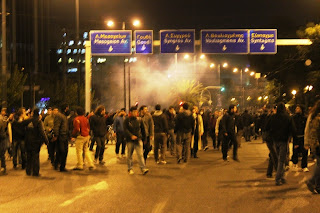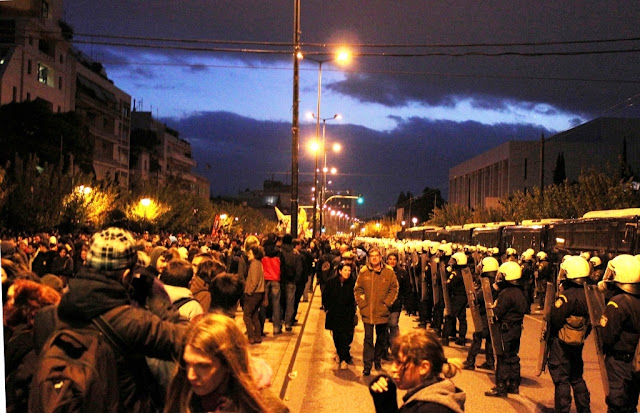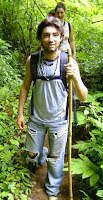I’d like to begin part two with an anecdote if I may (see part one for context).
Debt crises are nothing new in Greece. In archaic times, self serving aristocrats and oligarchs ruled over most city-states, their laws favouring the wealthy. If a man defaulted on a loan, his creditor could seize him and his family and sell them as slaves in order to repay it. This caused considerable conflict between the rich (who wanted to protect their investments) and the poor (who wanted to protect their liberty).
Then along came an Athenian lawmaker called Solon who instituted a series of radical reforms. He cancelled all debt, emancipated those who were slaves to it, and repealed the laws of Dracon (which, as you might have deduced, were so harsh they spawned the word draconian). He also allowed the poor to participate in government. In short, Solon created the worlds first free democratic society.
These reforms allowed Athens to reach its full potential. It would go on to become the cradle of western civilisation, the seed from which most of our present understanding of science, philosophy and engineering grew.
 |
| Closing shop on the route of the march |
This little facet of history was playing on my mind as I made my way towards Omonia Square to join the march commemorating the Athens Polytechnic Uprising. Dates and times may change but the basic story of history always seems to stay the same. Granted, people are not physically enslaved to debt these days. But a man with a mortgage to pay and mouths to feed is hardly free to fight for his beliefs, or to challenge those who threaten them. Some economists are advocating adopting a Solon type approach to solving current the debt crisis which is engulfing the western world. I made a mental note to ponder this thought further and set off on my merry way.
Fortunately I was not alone in my endeavours to understand a little corner of Greek society and its relevance to the wider world. Alongside me was a San Franciscan called Bryan, a Berkeley Architecture student who was a veteran of several active protests thanks his research into crowd dynamics in the context of urban spaces(!). He agreed to show me a few tips and tricks, I agreed to show him some good company (although I must admit I felt like a bit of dead weight around his neck).
The police and army presence en route was intense. On every street corner, battalions of uniforms loitered around, smoking cigarettes and slurping coffee. Many of them seemed riled up for a fight. I remember thinking this was fair enough, given the considerable number of marchers who made that feeling mutual. Then I noticed the faces of those who were in command. They were scared. That scared me. Fear elicits a fight or flight response in most of us. If those with the authority to sanction armed force are scared then they are not truly in control of either themselves or the situation. That is dangerous.
Anyways, we got to the beginning of the march and I’m not going to deny being disappointed. There were only around one thousand participants present. Many (I assume they were communists) carried red flags which were tied to thick red sticks which could easily double up as weapons. They also carried motorbike helmets (I assume to either use as weapons or to protect themselves in combat).
The march got under way and the authorities kept a low profile. A sneaking glance down the side streets along the way however confirmed that they were still abundantly present. As the march progressed they were joined by a variety of different groups with their own banners and their own agenda. By the time they reached Syntagma Square (home of the Greek Parliament, numbers had swelled to at least twenty thousand.
Syntagma Square was were most people expected the combustible crowd to spark into conflict. Troops lined the square protecting government buildings. I met a group of Red Cross workers who gave me some practical guidance on staying safe and some gels to combat the effects of tear gas. I decided to head to the east side of the square so that I was upwind of the authorities and any clouds of gas which they may chose to release.. The crowd were held back for around an hour. After a few minor scuffles, the march was allowed to progress past parliament and on towards the American embassy about six kilometres up the road. By this point there were over thirty thousand people marching. Male and female, rich and poor, old and young, they seemed to come from all walks of life.
 |
| Syntagma Square, with the Greek Parliament building in the background |
 |
| The young... |
 |
| ...and the old. This guy walked the full six kilometeres from the Greek Parliament to the American embassy. |
 |
| Veterans of the uprising. |
 |
| The police broke up some minor scuffles at Syntagma Square but on the whole, the march passed the Greek Parliament without incident. |
It took a further two hours for the main body of the group to arrive at the embassy which was heavily protected by police in full riot gear who were armed with rubber bullets, tear gas and stun grenades. By this point it was getting dark. As the group approached, the authorities cut all the street lights, cloaking the neighbourhood in an eerie darkness. After photographing the police and armed forces I decided that the safest place to observe this part of the march was alongside the throngs of international media personnel who had gathered at the north end of the embassy. One by one the journalists started putting on gas masks. I didn’t have one. It felt like a major faux pas of etiquette, kind of like how the new kid at school must feel when he turns up wearing the wrong brand of shoes!
I made another mental note. This time to invest in a gas mask if I ever do anything like this again.
The march reached a crescendo at the embassy. Some threw rocks, others charged police lines. Most however just carried on walking, unwilling to get caught up in the crossfire between protestors and police. As more and more people walked past, the mood of those remaining intensified. The authorities, clearly (and perhaps justifiably) becoming concerned for their own safety, fired off stun grenades and tear gas before charging at the protestors. I was unlucky enough to cop a few lungfulls of teargas (which I can only describe as feeling like drinking bleach whilst rubbing bars of soap on your eyes when you have a badly sunburnt face. Not nice).
At this point I made my own foolish fight of flight decision. Instead of making my way back towards the worlds media where I’d be safe, I ran up the street in the same direction as the protestors and found myself in the dead zone between stone throwing youths and charging police officers in full riot gear. Fortunately I managed to slide up a side street and passed a group of police officers who were kettling the exit; in the grand scheme of things they weren’t too bothered about a boy with a camera who was in over his head.

 At this point I made my own foolish fight of flight decision. Instead of making my way back towards the worlds media where I’d be safe, I ran up the street in the same direction as the protestors and found myself in the dead zone between stone throwing youths and charging police officers in full riot gear. Fortunately I managed to slide up a side street and passed a group of police officers who were kettling the exit; in the grand scheme of things they weren’t too bothered about a boy with a camera who was in over his head.
At this point I made my own foolish fight of flight decision. Instead of making my way back towards the worlds media where I’d be safe, I ran up the street in the same direction as the protestors and found myself in the dead zone between stone throwing youths and charging police officers in full riot gear. Fortunately I managed to slide up a side street and passed a group of police officers who were kettling the exit; in the grand scheme of things they weren’t too bothered about a boy with a camera who was in over his head.The next hour or so saw a series of scuffles and standoffs between the police and a hardcore of around five thousand protestors in the maze of side streets around the embassy. Fires were started, windows were smashed. The police responded with more tear gas and stun grenades. However, the levels of conflict were nowhere near what most people (including myself) expected. You could actually see the disappointment in some of the journalist’s eyes!
The most surreal thing about it was how so many people seemed to carry on with normal life. Even the street cafes stayed open as long as they could, only closing when the clouds of tear gas made it impossible to sit outside without considerable discomfort.
And so, with the scuffles dying down, I set of back towards my hotel near the Acropolis. I’d been on my feet for nine hours straight and all I wanted was a proper cup of tea. The metro system was closed and most of the city centre was under curfew. As a potential lawyer I had been intrigued to see how the Greek police (who have an appalling human rights record) dealt with the protest. As I was walking home I concluded that they probably did a good job, although that was probably more through chance than design. On reflection it seems that the mass of Greek people accept the terms of the EU bailout and the pain that their country is about to endure for at least a generation. If more of the crowd had been more combatative then I doubt things would have ended as peacefully as they did.
 |
| A happy old man sits on the steps of the closed Bank of Greece. |
And so, I finally got home, met up with a few other people who I was staying with and went to a karaoke bar (where they made me sing Beatles songs!). A thoroughly surreal end to a surreal day.




























